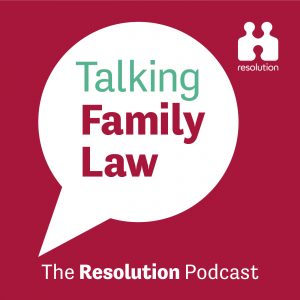Talking Family Law – the Resolution Podcast
Listen to Resolution’s podcast, with guest experts discussing topical issues in Family Law, with our hosts Simon Blain and Anita Mehta.
 We have now recorded over 40 episodes. Each episode is a deep dive into a particular aspect of family law. We cover general training as well as topical issues across the full spectrum of family law, from financial remedy and intervenors to abduction, private, and public law.
We have now recorded over 40 episodes. Each episode is a deep dive into a particular aspect of family law. We cover general training as well as topical issues across the full spectrum of family law, from financial remedy and intervenors to abduction, private, and public law.
In each episode, we ask our guests to explain what the law is at the date of recording. This includes the leading authority or relevant statute, practical tips, and thoughts for reform. Expect lively debate and personal insights. We encourage our guests to take part in open discussion as a way of providing legal commentary, on the understanding that no one is held to the views expressed on the podcast. Next week, they may argue the opposite on behalf of their clients.
We hope the podcast gives you a sense of what Resolution is all about, and that you consider joining us if you like what you hear. More importantly, this is our way of giving back to the family law community. Whoever you are, and wherever you’re based, this podcast gives you access to insights from the country’s leading experts. There is no need to pay a fee or travel to hear them speak. Instead, you can simply download the episode and listen on your way to work.
All we ask in return is that you share this link to the podcast with a friend or colleague who might be interested.
We were thrilled to be shortlisted for the Family Law Commentator of the Year award at the 2023 LexisNexis Awards. We were even more thrilled to win it in 2024!

Listen on the go:
DISCLAIMER: Nothing in any of the episodes is supposed to constitute legal advice. We invite our guests to express personal views by way of legal commentary, this may differ from how they put their client’s case.
No liability is accepted for any error or omission about the law in respect of a particular topic.